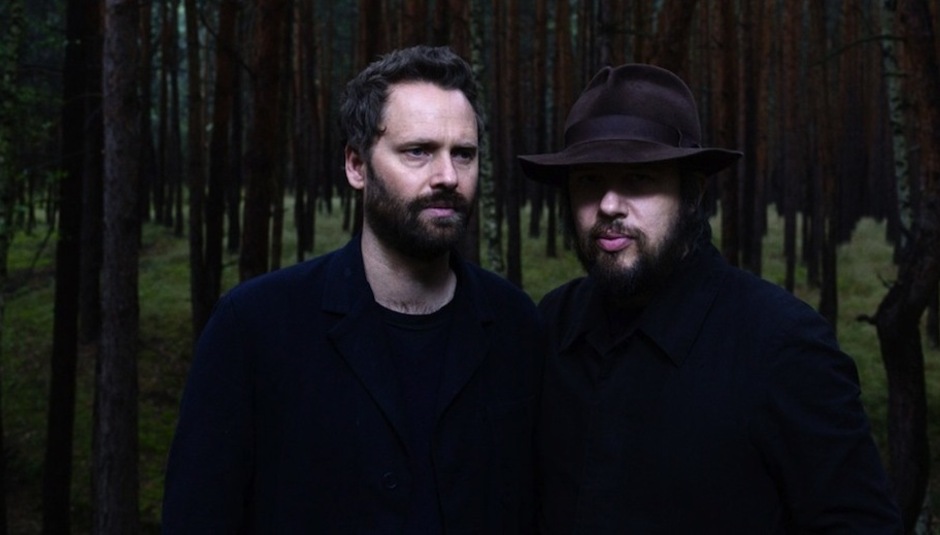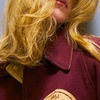"Hello? Hello? Can you guys hear me? My connection..."
Adam Wiltzie and I are on Skype waiting for Dustin O’Halloran to find a decent internet signal from his studio in Berlin. “Dustin’s studio is really bad for reception”, Wiltzie tells me from his Brussels home.
Until recently at least, Wiltzie has probably been best known for being half of celebrated ambient duo Stars of the Lid alongside Brian McBride, although he has also participated in a wide array of other projects in his various capacities as composer, musician and sound engineer. O’Halloran, also of seemingly dormant indie group Devics, has become increasingly renowned as a pianist and composer over the last five years. Put the pair together and you get A Winged Victory for the Sullen, a project which, in 2011, released a self-titled debut of such sublime beauty that it seemingly gained both musicians more attention than anything previously released in their careers to date.
Now the duo are back with Atomos, a second album made up of music originally composed for a joint project with choreographer Wayne McGregor. It’s a record that is perhaps even more brilliant than the first, and one that has had a genesis that surprised its own creators. With O’Halloran still searching for signal, I ask Wiltzie for some explanation on the topic of the record’s birth…
How did the collaboration with Wayne McGregor first come about?
AW: Initially just because he wrote us an email. He really loved our first record and his dance group had been using it as warm-up music when rehearsing... His dancers had reacted really well to it, and he was quite surprised about it given that there's no distinct tempo and it's quite slow, etc. So then he approached us asking if we fancied doing something with him and, although he's quite famous, I had no clue who he was because I know nothing about modern dance at all. In the back of my mind I'd always thought it might be cool to try at least once. We went to meet him and he turned out to be a really lovely person and it just developed from that.
When it came to writing - how did you approach writing for 'dance'?
AW: If I can step back and talk about dance as an art form for a second. It is one of the major art forms. I had gone to see some things in the past but I guess my heart wasn't really in there or perhaps I just didn't understand it. Maybe the problem was that I was trying to understand it. In terms of our compositions for this project he gave us an incredible amount of freedom. He let us start. Aside from some images and text he gave us it was all down to us. We weren't composing to the movements of the dancers or anything. There were inspirations that he had and that we came to share that got us on roughly the same page, so from there we just wrote a chunk of music and gave it to him. Then it became more of a back and forth process but all in a very short time span. In fact, this essentially all happened over around four months last summer.
That's very short time span compared to the first record took right?
AW: Yeah, I think from start to finish that took us about two years. From my point of view that's actually quite a quick turnaround. I've certainly never recorded so much music in such a short amount of time as I have with this record, which, as I say, was quite liberating. There's still ego in there but you don't have time to be overly precious about things. I think since then it's helped me with working on new music actually.
Am I correct in saying that you didn’t write this with music with the intention of it becoming the new record?
AW: No, not at all. We had other music that we were working on for the next record but we decided not to use any of that for the project with Wayne, just so there would be no baggage.
So when was it that you realised you had a new record on your hands?
AW: It wasn't until right at the end, when we did the premiere. We played it in its full form, and it had a beginning and an end... and it wasn't anything to do with the dance because we were down in the orchestra pit so we felt very isolated from that in a way. After the premiere and the first few dates Dustin and I realised we could potentially do something with this music and what you have on the record is everything from the dance piece bar one of the movements.
Have you made many changes?
AW: We got rid of ‘Atomos IV’, which we don’t talk about under any circumstances.
[Dustin finally manages to join the conversation]
DOH: It's pretty much the same. There are a few arrangement changes but when we were writing the score it wasn't written in a particularly different way to the way we write an album so it was a fairly natural way for us to write. It's not like we had to make an album version.
AW: There are a few mixing changes too but they are, effectively, going out on tour dancing to the record. In fact I think when they take it on tour soon they are literally taking the new record with them.
Were you surprised with the results when you saw the finished dance piece?
DOH: Yeah, I mean when Wayne first asked us to get involved I was really struggling to imagine how it would work out because I couldn't imagine anyone dancing to our music! The end result uses the music more as a shell for the dance to live inside. It's as much about the mood as it is about the sense of movement, which means the dancers are no longer dependent on a sense of rhythm. Once I understood that he was working in that way it suddenly made sense why he was asking us to do it.
One of the differences between this record and the debut is the inclusion of some electronic sounds…
AW: That came largely from the cluster of ideas that Wayne gave us. That led us down the path of using "electronics" or whatever you want to call these sounds.
DOH: I think one of the other reasons, perhaps, was that I had been having problems with my hands, which meant I had to take a break from the piano. So I had to find other ways to be musically creative. The first record was Adam and I sitting down with the piano and the guitar and creating the sounds from there but as we couldn't do that this time it forced us to seek out new ways to create music together.
AW: That was also very liberating because it made us realise that we could create together in a natural and organic way without being reliant on the piano in any way. With the exception of Dustin being in some pain at some points we actually had a really good time making the record.
I was going to ask about that...
DOH: Yeah. I've never thought of myself as a traditional pianist, more as a composer. So it was good to be forced away from the piano in a sense, because it's easy to fall back on it, to have it as a kind of standby. Not having it available forced us to find different ways to do things, so I focused more on the string arrangements and finding other textures. Limitations are always good and bring creative things out of you. All the circumstances for this record, that third influence especially, really helped us see what we could do with a blank slate. Adam and I built this up from zero and I think it is testament to how well we work together that we ended up with the record we have here now.
Given the strength of that creative partnership, was it always obvious to you both that this would be a long-term concern as opposed to just a one-off project?
AW: Not really. We had a really great experience doing the first record and then we toured. We've not known each other all that long. I don't really ever feel like there's some sort of "We're meant to make music together for the rest of our lives" kind of thing but we are both enjoying it at the moment. We live fairly close together. Berlin and Brussels aren't next door but we can be on a plane so quickly that it feels like the next town along. Most of our friends in our respective cities think the other one of us lives in the same city. So I'm out in Brussels and people are asking, "Where's Dustin?"
DOH: When we first started it was just to write a couple of songs but then as we were working it flowed so well that we realised that we had a whole album on our hands. Everything has just been a serendipitous series of events where we keep following the muse and I think, as we were writing this record, we were writing other pieces too, that so long as that muse keeps calling us we will keep making records together. For now it continues to feel fresh and inspiring. Adam and I both work alone a lot - and working with other people definitely does have its challenges - but I think we both feel that working together brings things out of us that we couldn't do on our own. I'm mystified as to how it happens but it does.
AW: That's the beautiful thing about collaboration. It enables you to achieve something you could never do just by yourself.
Do you usually get together in order to write?
DOH: We try to when we can because I think that's when the real magic happens. We do some things remotely but we feel that being in the same room together as much as we can only helps.
AW: On the first record there was barely anything that was done separately. It was pretty much always us together. For this one, mainly because of the time restraints, there were a few overdubs and things that we ended up doing in our respective studios.
I’m intrigued, given the upsurge in interest in ‘modern classical’ music of late, whether you see yourselves as a part of that movement, or even if you are aware of it?
AW: It's not something we really care about, to be honest.
DOH: Obviously we're influenced by a lot of things and that includes some classical composers - especially the dead guys - but I don't ever think of us in terms of being some kind of neoclassical project at all.
AW: It's a little frustrating because I've been making pretty much the same kind of music all my career but it gets put in different boxes depending on what the buzz term is at the time. It's like in the nineties when Stars of the Lid were apparently a post-rock band... I mean, in what sense? Are we still one now? It's like us and Tortoise lived together in the post-rock house or something.
Delay pedals everywhere…
AW: (Laughs) Obviously you need some form of classification for things but, personally speaking, I just end up getting more confused by the classifications.
Was there a personal connection between you two before you started working together, or did you very much bond through the creative process?
DOH: Well we'd both been living in Europe for a number of years. I was living in Italy at the time that we met and Adam was on tour with Sparklehorse. Neither of us really goes in for that whole typical American ex-pat thing. In fact, I think we were both pretty surprised to meet another American in Europe that we actually liked!
Were you familiar with one another’s music?
DOH: No, I think we just sent each other some CDs. I wasn't familiar with anything of Adam's...
AW: No I wasn't familiar with Dustin's music either. There's too much music out there in the world. I don't know how it is for you Ben, when listening to new stuff's part of your job, but for me - and this is as someone who doesn't do Spotify or anything - I'm never amazed that I've not heard something because there's so much to hear. Dustin's more of the music lover between us I think.
Did the experience of touring the debut record impact your approach to writing and recording Atomos at all?
DOH: Well I think we always knew that this was going to be a live performance so maybe we were more aware of putting things together, knowing that we had to duplicate this live. Obviously it had to be a faithful duplication too because the choreography was all based around the music. So that was something we were aware of and we deliberately set things up in a certain way.
AW: Also we got to know a group of string players in Brussels, who we are now good friends with, and now knowing them we know there are certain special things they can bring out. A little of their personality seeps through onto this record too, I think. Touring kind of made us a proper band I suppose.
DOH: When we made the first record we didn't even know if we were going to play live. It was never planned per se. So when we were first figuring out how to play the stuff live I think I was quite surprised at how well it worked. I think it's definitely something that's propelled us into continuing the project as well because, especially with the string players we now have that we love to play with, we have these really special moments live and we really enjoy it.
So, after the success of this venture, are you going to work to a deadline again next time around?
AW: (Laughs) No. I don't think so. It was terrifying. With commercial work you need a deadline of some kind or it doesn't get done but generally no.
So we should expect the next record in about eight years time then?
AW: Or maybe never!
That's a bit of a bum note to end things on!
AW: No, it's not a bummer. We've got two beautiful records that we're both really happy with. What more could we want?
Atomos is out this week via Erased Tapes.
Tour Dates:
17th October, BRIGHTON, St George's Church
18th October, CARDIFF, Dimswn
19th October, LONDON, Milton Court (Barbican) SOLD OUT
20th October, LONDON, Milton Court (Barbican)























